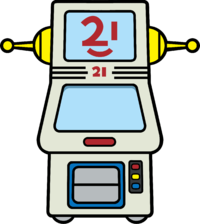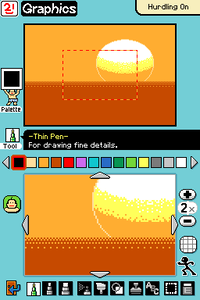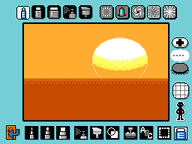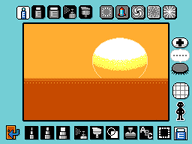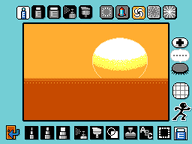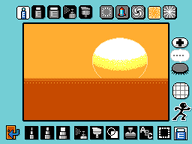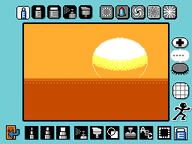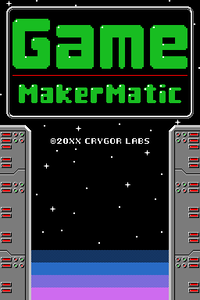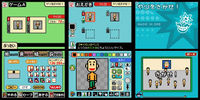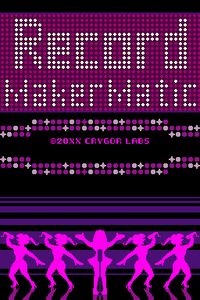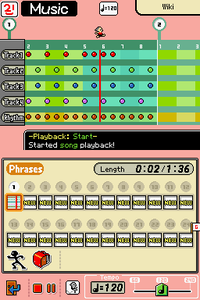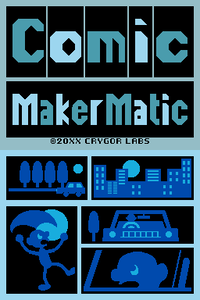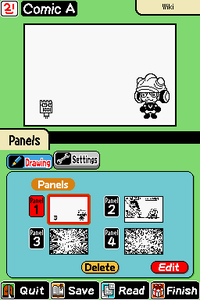Super MakerMatic 21
This article is under construction. Therefore, please excuse its informal appearance while it is being worked on. We hope to have it completed as soon as possible.
The Super MakerMatic 21 is a machine that can create games, as well as records and comics. It appears in WarioWare: D.I.Y.
After having a nightmare where creatures emerge from his TV, Dr. Crygor gets the idea to create the MakerMatic. Wario asks him to fix his TV, but upon seeing the machines, he asks to trade. Dr. Crygor explains that they are not TVs and tells him how they work. Wario then decides that money can be made out of them by making games. Afterwards, Wario hires the player to make and sell games to make him money.
The machine contains tools that can be used to draw graphics, make music and assign AI (Action Instructions) with ease. Penny hosts the tutorial for using the Super MakerMatic. It has three different options: Game MakerMatic, Record MakerMatic and Comic MakerMatic.
[edit]
Graphics editing[edit]
The graphics editor is found in the Game MakerMatic and the Comic MakerMatic modes. While mostly identical between all versions, the Comic version removes color-related options due to the black-and-white limitation and features different Picture Stamps. Some animation-aid tools are also only available in the art editing mode of the Game MakerMatic.
Palette: The palette in the Game mode is comprised of seven 14-item pages: one page of solid colors, two pages of simple colored patterns and stripes, one page of black-and-white patterns, one page of concrete elements (such as brick walls, audience members and water) and two pages for custom-made patterns. In the Comic mode, it is comprised of two 14-item pages: one page for textures and one page for custom-made patterns.
Palette/Stamp/Character Orientation: The palette, picture stamp or character stamp may be rotated or flipped. This tool is represented by the Dude in Undies for the Palette mode and his alternative caveman and leotard-clad forms for the Stamp and Character modes respectively.
Zoom In/Zoom Out: The canvas may be zoomed in to two, four, eight or 16 times the normal size.
Grid Guide: A grid dividing the canvas into 8×8 pixel squares may be displayed.
Time Traveler: Allows undoing and redoing the last action.
Shapes: Allows the drawing of the following shapes: Thin Line, Medium Line, Thick Line, Rectangle (Thin Border), Rectangle (Thick Border), Solid Rectangle, Ellipse (Thin Border), Ellipse (Thick Border), Solid Ellipse.
Picture Stamp: Includes selections of pre-made art. As they differ between each mode, see the listing of available stamps on the appropriate sections for Game MakerMatic Picture Stamps and Comic MakerMatic Picture Stamps.
Character Stamp: Includes text characters in five Font Styles, each one with three different sizes. The styles are the following:
- Fun: "A lively and comical font style." (This is the previously recurrent WarioWare font)
- Elegant: "A classy and refined font style."
- Bold: "A strong, bulky font style." (This is the real-life DFPゴシック体 font)
- Calligraphy: "A font written by a calligraphy master." (This is the real life DFP行楷書 font)
- Ghostly: "A mysterious and scary font style." (This is the real life DF康印体 font)
- 8-bit: "A pixelized font style." (This is the text style commonly seen in Famicom/Nintendo Entertainment System games)
Frame Tool: Allows selecting a rectangular section of the canvas and moving or copying it.
Eraser: Includes eraser versions of the three Pen, the Spray and the Paintbrush (Fill) tools, as well as five erasing effects:
- Total Erase: "You wiped everything clean!"
- Rocket Erase: "Go, go rocket! Erasing from the ground up!"
- Swirl Erase: "Whoa, whoa--I'm swirling away, aaaaaahhh!"
- Fade-Out Erase: "Fading...fast...Erased...into tiny particles..."
- Warp Erase: "I can see through time! AND I'm erasing!
All non-instant erasing effects can be halted at any point, allowing the player to use them for visual effects instead. This is demonstrated by Penny during the Comic MakerMatic tutorial.
Music editing[edit]
The music editor is found in the Game and Record MakerMatic modes.
The player edits one phrase at a time, which corresponds to the length of a normal microgame. A phrase is divided into two pages: a front page and a back page, each one being four four-beat measures long. It is also comprised of five Tracks corresponding to different voices, the four first suited for melodies, and the last one being used for rhythm, with its own sets of percussion instrument options. The instrument and volume settings are available for each Track independently and affect all notes of that phrase.
| Track Bar: Used for Track selection. |
| Instrument Type: Allows the selection of the instrument used in the current Track. |
| Volume: Allows the selection of the volume used in the current Track from a set of four different intensities plus a mute option. |
| Balance: Allows the selection of the balance used in the current track from the following set of options: Way Left, Slightly Left, Centered, Slightly Right and Way Right. |
| Page Forward/Page Back: Allows changing between both pages for editing. |
| Time Traveler: Allows undoing and redoing the last action. |
| Stop: Stops phrase playback. |
| Play: Play phrase. |
| Playback: Allows changing between Solo playback (only the current Track plays) and All playback (all Tracks play). |
| Note Marker: Allows placing note markers on the sheet, indicating notes. |
| Note Eraser: Allows removing note markers from the sheet. |
| Frame Tool: Allows selecting a set of notes and moving or copying it. |
| Hum Mode: The player may record sound using the system's microphone, which is then converted into notes. |
Instruments[edit]
Track instruments[edit]
The available instruments for Tracks are:
Instrument Group I demonstration tunes
Instrument Group I: "Common instruments like pianos and flutes."
 Piano: "An instrument anyone should be familiar with."
Piano: "An instrument anyone should be familiar with." Organ: "An instrument often found in churches."
Organ: "An instrument often found in churches." Harpsichord: "An instrument often used in classical music."
Harpsichord: "An instrument often used in classical music." Melodica: "A keyboard that is blown to produce sound."
Melodica: "A keyboard that is blown to produce sound." Flute: "A member of the woodwind-instrument family."
Flute: "A member of the woodwind-instrument family." Trumpet: "A brass instrument played with three valves."
Trumpet: "A brass instrument played with three valves." Saxophone: "A woodwind instrument known for jazzy tones."
Saxophone: "A woodwind instrument known for jazzy tones." Wood Flute: "A woodwind instrument with harmonic tones."
Wood Flute: "A woodwind instrument with harmonic tones."
Instrument Group II demonstration tunes
Instrument Group II: "Guitars and other instruments like that."
 Acoustic Guitar: "A guitar suitable for classic or folk tunes."
Acoustic Guitar: "A guitar suitable for classic or folk tunes." Electric Guitar: "A powered guitar for extended rocking."
Electric Guitar: "A powered guitar for extended rocking." Banjo: "A stringed instrument with "twangy" tones."
Banjo: "A stringed instrument with "twangy" tones." Bass: "A stringed instrument used for low notes."
Bass: "A stringed instrument used for low notes." Violin: "A stringed instrument played using a bow."
Violin: "A stringed instrument played using a bow." Marimba: "Instrument played by hitting keys with mallets."
Marimba: "Instrument played by hitting keys with mallets." Vibraphone: "Like the marimba but with a metallic sound."
Vibraphone: "Like the marimba but with a metallic sound." Timpani: "Big drums that produce a range of sound."
Timpani: "Big drums that produce a range of sound."
SF demonstration tunes
SF: "Futuristic and mysterious sounds."
 Star Drop: "A spacy, ringy-dingy sort of sound."
Star Drop: "A spacy, ringy-dingy sort of sound." UFO: "Ever heard a UFO light up? Sounds like this."
UFO: "Ever heard a UFO light up? Sounds like this." Alien: "Sounds just like an alien talking."
Alien: "Sounds just like an alien talking." Robot: "The electronic voice of a fat robot."
Robot: "The electronic voice of a fat robot." Rocket: "All systems GO! My rocket sounds like this."
Rocket: "All systems GO! My rocket sounds like this." Moon: "The moon's a comedian; he sounds like this."
Moon: "The moon's a comedian; he sounds like this." Green Dude: "Stretchy, rubbery green dude. What?"
Green Dude: "Stretchy, rubbery green dude. What?" Phone Dial: "If you're calling from a touch-tone phone..."
Phone Dial: "If you're calling from a touch-tone phone..."
Creatures demonstration tunes
Creatures: "Animal sounds."
 Cat: "Meow, meow? Yep, that's a cat."
Cat: "Meow, meow? Yep, that's a cat." Dog: "Woof, woof. A dog! I'd know it anywhere!"
Dog: "Woof, woof. A dog! I'd know it anywhere!" Pig: "Sorta nasty pig oink."
Pig: "Sorta nasty pig oink." Insects: "A few different insect sounds."
Insects: "A few different insect sounds." Frog: "We ALMOST got it to sound just like a frog."
Frog: "We ALMOST got it to sound just like a frog." Yoshi: "Yoshi does indeed make sounds like this."
Yoshi: "Yoshi does indeed make sounds like this." Birds: "Some bird sounds. Er...um, 'calls'?"
Birds: "Some bird sounds. Er...um, 'calls'?" Monkeys: "Several very monkeylike animal noises."
Monkeys: "Several very monkeylike animal noises."
Voice demonstration tunes
Voice: "Human voices."
 Do-Re-Mi Voice: "Do, re, mi... What a cutey!"
Do-Re-Mi Voice: "Do, re, mi... What a cutey!" Wah Dude: "This dude likes to sing low 'wah' sounds."
Wah Dude: "This dude likes to sing low 'wah' sounds." Opera Man: "An opera singer with a thick beard."
Opera Man: "An opera singer with a thick beard." Soul Girl: "Man, does she have some PIPES!"
Soul Girl: "Man, does she have some PIPES!" Baby: "It's totally a baby. I swear. Seriously."
Baby: "It's totally a baby. I swear. Seriously." Laughing Men: "Are you ticklish?"
Laughing Men: "Are you ticklish?" Kung-Fu Men: "Tough guys, the whole lot of 'em."
Kung-Fu Men: "Tough guys, the whole lot of 'em." Humming: "This guy's having a great day, every day."
Humming: "This guy's having a great day, every day."
8-Bit demonstration tunes
8-Bit: "8-bit-era game sounds."
 Ding-Ding: "A straightforward sound, good for melodies."
Ding-Ding: "A straightforward sound, good for melodies." Pong-Pong: "A nice little sound with a nice little echo."
Pong-Pong: "A nice little sound with a nice little echo." Fah-Fah: "An organ? A whistle? No one knows."
Fah-Fah: "An organ? A whistle? No one knows." Bong-Bong: "A low, slightly electrified sound."
Bong-Bong: "A low, slightly electrified sound." Bing-Bing: "Sort of human. Sort of electronic. Bing!"
Bing-Bing: "Sort of human. Sort of electronic. Bing!" Ting-Ting: "A high, airy sound. Brrrr, chilly."
Ting-Ting: "A high, airy sound. Brrrr, chilly." Bling-Bling: "Star pixies falling from space sound like this."
Bling-Bling: "Star pixies falling from space sound like this." Boon-Boon: "Boon-boon? Yes, boon-boon. Why?"
Boon-Boon: "Boon-boon? Yes, boon-boon. Why?"
Notes[edit]
- In the Japanese version, the
 Robot,
Robot,  Rocket and
Rocket and  Moon instruments are instead known as
Moon instruments are instead known as  ちゃいろきモノ Chairokimono ("brown thing"),
ちゃいろきモノ Chairokimono ("brown thing"),  おしりっぽいもの Oshirippoimono ("buttock-like guy") and
おしりっぽいもの Oshirippoimono ("buttock-like guy") and  パンツっぽいもの Pantsuppoimono ("underpants-like guy") respectively.
パンツっぽいもの Pantsuppoimono ("underpants-like guy") respectively. - In the Japanese version, the Banjo, Marimba and Vibraphone are instead called shamisen, xylophone and glockenspiel, respectively, but their sounds and icons are identical to the international version.
- In the Japanese version, the icon for
 Kung-Fu Men is
Kung-Fu Men is  .
.
Rhythm sets[edit]
The available rhythm sets are: Normal Drums, Electric Drums, Samba Drums, Asian Drums, Kitchen Drums, Toy Drums, Beat-Box Drums and 8-Bit Drums.
(Note: Icons are arranged left to right, bottom to top.)
Normal Drums: "Common-use percussion instruments."
Electric Drums: "Powered drums for extended rocking."
Samba Drums: "Drums that will make you want to dance."
Asian Drums: "Drums that offer wild, exotic sounds."
Kitchen Drums: "A set of drums made up of pots and stuff."
Toy Drums: "Drums? No, toys played as drums."
Beat-Box Drums: "Percussive sounds made by people."
8-Bit Drums: "Drum sounds from 8-bit games."
Modes[edit]
Game MakerMatic[edit]
Allowing the creation of microgames (referred to simply as "games"), this is the most prominent feature of the Super MakerMatic 21. Games are made by creating objects (described by the game as the game's "actors"), writing the behaviour for these objects through Action Instructions or AI, and also creating the background and music. After completed, the game may be shipped off to sell, and the player may play any of their microgames in the D.I.Y. Shop.
Graphics[edit]
This section contains a Background subsection, where the player may draw or import the background from an existing microgame found in the D.I.Y Shop. Imported backgrounds can be edited normally.
In the Objects subsection, all 15 available object slots are listed. Objects have from one to four "arts" (animations), and each art is comprised from one to four "cels" (frames). The player has 256 available points to be distributed among any number of objects. Each object deducts points from the player's total in a per cel basis. The available cel sizes are 16×16, 32×32, 48×48, or 64×64 pixels, costing one, four, nine, or 16 points respectively, and each object has a fixed cel size, picked when this object is created.
The player may also import objects from games from the D.I.Y. Shop.
When creating an object, the player must choose:
- a name for the object up to nine characters long. If not inserted, the game generates a name in the pattern
OBJECTⓃ, whereⓃis the underscored digit character that would form the first available name in this pattern starting fromOBJECT①up toOBJECT⑮. - the size of the object. Once set, the size cannot be changed.
- a name for the first art up to nine characters long. If not inserted, the game generates the default name
ARTⒶ. Following arts created without name input will have their names default to the same format,ARTⓐ, whereⓐisⒶ,Ⓑ,ⒸorⒹ, depending on the first available option.
Apart from the smaller canvas, drawing art for cels works almost exactly like drawing backgrounds, but some exclusive functions for aiding animation and cel handling are available as well.
| Back One Cell/Forward One Cell: Aids navigation between cels. |
| Add Cel: Adds a cel to the art if fewer than four cels exist. |
| Delete Cel: Remove the current cel. |
| Import: Imports a cel from another art in the same object. |
| Art Animation: Plays or stops playing the current art, visible on the top screen. |
| Animation Speed: Allows selecting the animation speed. |
| Background Display: Displays the background on the top screen and overlays the current art on it and allows moving it around. |
| Trace Display: An onion skin effect, faintly displaying the previous cel on the canvas. |
In the art selection screen, the player may edit an art's name, edit, delete it or import art from another object.
Picture stamps[edit]
Game MakerMatic stamps are divided as follows:
- Landscape: "For applying landscape elements."
- Body Parts: "For applying eyes, mouths, etc."
- 8-Bit: "For applying 8-bit pixel art."
- D.I.Y.: "For applying your custom-made stamps."
Music[edit]
The music making tool in the Game MakerMatic works as elaborated above, but also includes the Maestro option, which generates a phrase. The creator may request a tune fitting a certain "mood" ("relaxed", "normal" or "frenzied") and "style" ("fun", "sad", "factory", "spicy", "spooky" or "8-bit"), or pick a random setting using the "auto" option.
Importing a phrase from another game or record is possible as well.
Assembly[edit]
Here, the Action Instructions (AI), which are the script components of the game, are created for objects. Each one of the objects created in the Graphics section may be assigned up to five regular AI, being required to be assigned a starting condition (the Start) beforehand.
Once an object's starting condition is created, it is marked with an "AI" icon on its thumbnail, and it is assigned a switch, which is a simple boolean variable associated with it. The switch can be turned on or off by an action defined in an AI, and its state can be used as a trigger by any other object and required for setting win conditions, making it one of the most fundamental components of the game's scripting system.
Start[edit]
The Start (also refered to as starting condition) defines the initial state of the object and follows the following steps—left to right here—for the object's art, and then for its location:
| Art | ||
|---|---|---|
| Steps | Resulting art statement | |
| Set to which art? | Animation style and speed?ab | Set art to [selected art] and [selected animation style]. |
| Location | ||||
|---|---|---|---|---|
| Steps | Resulting location statement | |||
| Location "The object starts at a specified point or randomly within a specified area." |
Point "The object starts at a precise location on the stage." |
Where? | Locate at [selected location]. | |
| Area "The object starts at a randomly selected location within a selected rectangular area. The starting point changes with each play." |
Anywhere "The object will be placed randomly within the area without regard for overlapping with other objects." |
What area? | Locate within [selected area]. | |
| Try not to overlap "The object will be placed randomly within the area without overlapping other objects, if possible." |
What area? | Locate within [selected area]. | ||
| Attach to object "The object starts attached to another object. Unavailable if there are no other objects with AI assigned." |
Attach to which object? | Where? | Attach to [selected object]. | |
AI[edit]
The regular AI (numbered ① through ⑤) are comprised of a Trigger and Actions, that is, the events checked for actions to occur, and the resulting actions themselves, respectively.
Triggers[edit]
Up to six members can be added to the Trigger of an AI, and these members must all be activated for the trigger to occur. If instead the player wishes to have independent sets of events trigger the same action or actions, separate AI must be used instead.
The available Trigger options are:
| Primary trigger type | Option tree | Result trigger | |||||
|---|---|---|---|---|---|---|---|
| Tap "Triggered when this object is tapped or the stage is tapped." |
This object "Triggered by this object being tapped." |
When [this object] is tapped | |||||
| Anywhere on stage "Triggered when any part of the stage is tapped." |
When the stage is tapped | ||||||
| Time "Triggered when a certain time is reached." |
Exactly "Triggered when a particular time is reached." |
When? | When time [selected time] is hit | ||||
| Randomly "Triggered when a random time within a selected range is reached." |
Randomly between what points? | When a time from [selected starting time] to [selected final time] is hit | |||||
| Contact "Triggered when this object touches or overlaps another object or area." |
Touch "Triggered when this object touches a selected object or area." |
Another object "Triggered when this object touches a specific other object." |
Which object? | When [this object] touches [selected object] | |||
| Location "Triggered when this object touches a selected area." |
Which area? | When [this object] touches [selected area] | |||||
| Overlap "Triggered when this object overlaps a selected object or area." |
Another object "Triggered when this object overlaps a specific other object." |
Which object? | While [this object] overlaps [selected object] | ||||
| Location "Triggered when this object overlaps a selected area." |
Which area? | While [this object] overlaps [selected area] | |||||
| Switch "Triggered by the switch of this object or another object." |
Trigger on which switch? | Switch turns ON "Triggered when the switch changes from OFF to ON." |
When [selected object] switch turns ON | ||||
| Switch is ON "Triggered while the switch is ON." |
While [selected object] switch is ON | ||||||
| Switch turns OFF "Triggered when the switch changes from ON to OFF." |
When [selected object] switch turns OFF | ||||||
| Switch is OFF "Triggered while the switch is OFF." |
While [selected object] switch is OFF | ||||||
| Art "Triggered by the state or type of art for this object." |
Specific art "Triggered when the specified art is being displayed." |
While using which art? | While art is set to [selected art] | ||||
| When art finishes playing "Triggered when the current art finishes playing." |
When art finishes playing | ||||||
| Win/Loss "Triggered by the game being won or lost." |
Win "Triggered when the game is won." |
When game is won | |||||
| Loss "Triggered when the game is lost." |
When game is lost | ||||||
| Has been won "Triggered when the game has been won." |
While game has been won | ||||||
| Has been lost "Triggered when the game has been lost." |
While game has been lost | ||||||
| Not yet won "Triggered when the game has not yet been won." |
While game is not yet won | ||||||
| Not yet lost "Triggered when the game has not yet been lost." |
While game is not yet lost | ||||||
Actions[edit]
The available Actions are:
| Primary action type | Option tree | Result action | |||||||||||||||||||
|---|---|---|---|---|---|---|---|---|---|---|---|---|---|---|---|---|---|---|---|---|---|
| Travel "This object starts or stops traveling or changes its mode of travel." |
Go straight "This object travels in a straight line." |
Current location "travels from its current location." |
Specific direction "Travels straight in a specified direction." |
Which direction?c | Speed?d | Go [selected direction]. | |||||||||||||||
| Random directionc "Travels straight in a randomly selected direction." |
Speed?d | Go some direction. | |||||||||||||||||||
| Specific location "Travels straight toward a selected location on stage." |
Move to where? | Speed?d | Go to [selected location]. | ||||||||||||||||||
| Another location "Jumps to another location before traveling." |
Point "Goes straight from a precise location on the stage." |
Start from what point? | Specific direction "Travels straight in a specified direction." |
Which direction?c | Speed?d | Go [selected direction] from [selected location]. | |||||||||||||||
| Random directionc "Travels straight in a randomly selected direction." |
Speed?d | Go some direction from [selected location]. | |||||||||||||||||||
| Specific location "Travels straight toward a selected location on stage." |
Move to where? | Speed?d | Go from [selected starting location] to [selected target location]. | ||||||||||||||||||
| Another object "Goes straight from near another object." |
From which object? | Start from where? | Specific direction "Travels straight in a specified direction." |
Which direction?c | Speed?d | Go [selected direction] from [selected object]. | |||||||||||||||
| Random directionc "Travels straight in a randomly selected direction." |
Speed?d | Go some direction from [selected object]. | |||||||||||||||||||
| Specific location "Travels straight toward a selected location on stage." |
Move to where? | Speed?d | Go from [selected object] to [selected location]. | ||||||||||||||||||
| Stop "This object comes to a stop if in motion or remains stopped if motionless." |
Stop traveling. | ||||||||||||||||||||
| Jump to "This object warps instantly to another location." |
Location "Jumps to a location anywhere on the stage." |
Point "Jumps to a precise location on the stage." |
Move to where? | Jump to [selected location]. | |||||||||||||||||
| Area "Jumps to a random location within the selected area." |
Anywhere "Jumps without regard for overlapping other objects in the selected area." |
Which area? | Jump to somewhere in [selected area]. | ||||||||||||||||||
| Try not to overlap "Jumps to the area without overlapping other objects, if possible." |
Which area? | Jump to somewhere in [selected area]. | |||||||||||||||||||
| Another object "Jumps near another object, then stays attached to that object." |
Which object? | Jump to where? | Jump to [selected object]. | ||||||||||||||||||
| Swap "This object swaps locations with another object." |
Swap positions with which object? | Swap places with [selected object]. | |||||||||||||||||||
| Roam "This object roams within a specified area." |
Wiggle "Wiggles at random within a selected area." |
Anywhere "Roams without regard for overlapping other objects in the selected area." |
Roam within what area? | Speed? | Roam within [selected area]. | ||||||||||||||||
| Try not to overlap "Roams within the area without overlapping other objects, if possible." |
Roam within what area? | Speed? | Roam within [selected area]. | ||||||||||||||||||
| Insect "Buzzes around like an insect within a selected area." |
Anywhere "Roams without regard for overlapping other objects in the selected area." |
Roam within what area? | Speed? | Roam within [selected area]. | |||||||||||||||||
| Try not to overlap "Roams within the area without overlapping other objects, if possible." |
Roam within what area? | Speed? | Roam within [selected area]. | ||||||||||||||||||
| Reflect "Careens around a selected area, reflecting off the boundaries." |
Anywhere "Roams without regard for overlapping other objects in the selected area." |
Roam within what area? | Speed? | Roam within [selected area]. | |||||||||||||||||
| Try not to overlap "Roams within the area without overlapping other objects, if possible." |
Roam within what area? | Speed? | Roam within [selected area]. | ||||||||||||||||||
| Bounce "Bounces up and down within a selected area." |
Anywhere "Roams without regard for overlapping other objects in the selected area." |
Roam within what area? | Speed? | Roam within [selected area]. | |||||||||||||||||
| Try not to overlap "Roams within the area without overlapping other objects, if possible." |
Roam within what area? | Speed? | Roam within [selected area]. | ||||||||||||||||||
| Target "This object targets and approaches another object." |
Target which object? | Target where on the object? | Speed?d | Target [selected object]. | |||||||||||||||||
| Switch "The switch for this object turns OFF or ON. Switches start in the OFF position." |
Turn switch ON "Turns this object's switch ON. If already ON, it remains ON. |
Turn [this object] switch ON. | |||||||||||||||||||
| Turn switch OFF "Turns this object's switch OFF. If already OFF, it remains OFF." |
Turn [this object] switch OFF. | ||||||||||||||||||||
| Lose "The game ends in a loss. This has no effect if the game has already been won." |
— | End game in a loss. | |||||||||||||||||||
| Art "This object's turns art stops playing or changes to different art." |
Change "Changes the art for this object to a new art. Select the same art to start displaying it again." |
Set to which art? | Animation style and speed?ab | Change art to [selected art]. | |||||||||||||||||
| Stop playing "Stops animating the art for this object. This has no effect if the art is not currently animating." |
Stop playing art. | ||||||||||||||||||||
| Sound Effect "A sound effect plays. There are 64 different sounds available." |
Action "Loud, actiony sounds, including explosions, breaking glass, and guns." |
Explosion "The sound of something blowing up." |
Play EXPLOSION sound effect. | ||||||||||||||||||
| Glass "The sound of glass breaking." |
Play GLASS sound effect. | ||||||||||||||||||||
| Gong "The sound of a gong being struck...with a hammer." |
Play GONG sound effect. | ||||||||||||||||||||
| Spring "The sound of a spring (like in a jack-in-the-box) being sprung." |
Play SPRING sound effect. | ||||||||||||||||||||
| Pistol "The sound of a pistol gunshot." |
Play PISTOL sound effect. | ||||||||||||||||||||
| Slice "The sound of something being sliced with a sword." |
Play SLICE sound effect. | ||||||||||||||||||||
| Camera "The sound of a camera shutter." |
Play CAMERA sound effect. | ||||||||||||||||||||
| Splash "The sound of something falling into water." |
Play SPLASH sound effect. | ||||||||||||||||||||
| Computer "Boopy-beepy sounds--everything from bing-bong to boop-boop." |
Correct "An electronic sound indicating a correct answer." |
Play CORRECT sound effect. | |||||||||||||||||||
| Incorrect "An electronic sound indicating an incorrect answer." |
Play INCORRECT sound effect. | ||||||||||||||||||||
| Switch "An electronic sound that might be used when activating a switch, etc." |
Play switch sound effect. | ||||||||||||||||||||
| Input "A short electronic sound useful for character or button inputs." |
Play INPUT sound effect. | ||||||||||||||||||||
| Falling "An electronic sound useful for falling objects." |
Play FALLING sound effect. | ||||||||||||||||||||
| Wiggle "An electronic sound useful for something wiggly and/or jiggly." |
Play WIGGLE sound effect. | ||||||||||||||||||||
| Rising "An electronic sound useful for objects that rise slowly." |
Play RISING sound effect. | ||||||||||||||||||||
| Victory "A satisfying electronic sound indicating some sort of success." |
Play VICTORY sound effect. | ||||||||||||||||||||
| Sports "Sounds heard at sporting events, like a bat hitting a ball or a soccer kick." |
Batting "The sound of a bat hitting a ball." |
Play BATTING sound effect. | |||||||||||||||||||
| Swing "The sound of swinging and missing." |
Play SWING sound effect. | ||||||||||||||||||||
| Impact "The sound of impact, such as when a ball hits a baseball glove." |
Play IMPACT sound effect. | ||||||||||||||||||||
| Kick "The sound of kicking a soccer ball." |
Play KICK sound effect. | ||||||||||||||||||||
| Racquet "The sound of a racquet hitting a ball or badminton birdie." |
Play RACQUET sound effect. | ||||||||||||||||||||
| Bowling "The sound of a bowling ball knocking down the pins." |
Play BOWLING sound effect. | ||||||||||||||||||||
| Sunk Putt "The sound of a golf ball going into the hole." |
Play SUNK PUTT sound effect. | ||||||||||||||||||||
| Whistle "The sound of a referee's whistle." |
Play WHISTLE sound effect. | ||||||||||||||||||||
| General "Sounds made by everyday objects like clanging pans, bells and corks." |
Frying pan "The sound of a frying pan hitting...something." |
Play FRYING PAN sound effect. | |||||||||||||||||||
| Bell "A bell sound, which could also be the sound of two glasses toasting." |
Play BELL sound effect. | ||||||||||||||||||||
| Knife Chop "The sound of a knife chopping through something on a wooden cutting board." |
Play KNIFE CHOP sound effect. | ||||||||||||||||||||
| Cell Phone "A cell-phone ringtone." |
Play CELL PHONE sound effect. | ||||||||||||||||||||
| Shaver "The sound of an electric shaver in action." |
Play SHAVER sound effect. | ||||||||||||||||||||
| Old Phone "A dull ringing sound like from an old-style telephone." |
Play OLD PHONE sound effect. | ||||||||||||||||||||
| Popped Cork "The sound of a cork being popped." |
Play POPPED CORK sound effect. | ||||||||||||||||||||
| Water "The sound water running or being poured out of a bucket." |
Play WATER sound effect. | ||||||||||||||||||||
| Body "Body-related sounds, like sneezing or clapping hands." |
Sneeze "A sneezing sound." |
Play SNEEZE sound effect. | |||||||||||||||||||
| Snap "The sound of a finger snap." |
Play SNAP sound effect. | ||||||||||||||||||||
| Munching "The sound of something being eaten." |
Play MUNCHING sound effect. | ||||||||||||||||||||
| Gulp "The sound of taking a big gulp of your drink." |
Play GULP sound effect. | ||||||||||||||||||||
| Punch "The sound of punching something." |
Play PUNCH sound effect. | ||||||||||||||||||||
| Foot Stamp "The sound of a foot stomping on a hard surface." |
Play FOOT STAMP sound effect. | ||||||||||||||||||||
| Gasp "A quick gasping sound." |
Play GASP sound effect. | ||||||||||||||||||||
| Applause "The sound of hands clapping." |
Play APPLAUSE sound effect. | ||||||||||||||||||||
| Creature "Sounds from various animals, like cats, dogs, and birds." |
Cat "A cat's meow." |
Play CAT sound effect. | |||||||||||||||||||
| Big Dog "A big dog's bark." |
Play BIG DOG sound effect. | ||||||||||||||||||||
| Pig "A pig's oink." |
Play PIG sound effect. | ||||||||||||||||||||
| Small Dog "A small dog's bark." |
Play SMALL DOG sound effect. | ||||||||||||||||||||
| Wolf "A wolf's howl." |
Play WOLF sound effect. | ||||||||||||||||||||
| Crow "A crow's caw." |
Play CROW sound effect. | ||||||||||||||||||||
| Tiger "A tiger's roar." |
Play TIGER sound effect. | ||||||||||||||||||||
| Wing Flap "A wing-flap sound." |
Play WING FLAP sound effect. | ||||||||||||||||||||
| Voice "Vocal sounds like laughing, screaming, or...baby hiccupping." |
Baby "A giggly baby-hiccup sound." |
Play BABY sound effect. | |||||||||||||||||||
| Giggle "A giggly laughing sound." |
Play GIGGLE sound effect. | ||||||||||||||||||||
| Scream "An authentic screaming sound." |
Play SCREAM sound effect. | ||||||||||||||||||||
| Bummed "A sound indicating minor disappointment." |
Play BUMMED sound effect. | ||||||||||||||||||||
| Kung Fu "An enthusiastic 'kung-fu' vocal burst." |
Play KUNG FU sound effect. | ||||||||||||||||||||
| Let's Fight "A manly call to arms." |
Play LET'S FIGHT sound effect. | ||||||||||||||||||||
| Cheering "The sound of a cheering crowd." |
Play CHEERING sound effect. | ||||||||||||||||||||
| Booing "The sound of a booing crowd." |
Play BOOING sound effect. | ||||||||||||||||||||
| 8-Bit "Sounds from classic Nintendo games, like Mario jumping and powering up." |
Mario Jump "The sound of Mario jumping. (Super Mario Bros.)" |
Play MARIO JUMP sound effect. | |||||||||||||||||||
| Coin "The sound of Mario getting a coin. (Super Mario Bros.)" |
Play COIN sound effect. | ||||||||||||||||||||
| Power Up "The sound of getting a mushroom. (Super Mario Bros.)" |
Play POWER UP sound effect. | ||||||||||||||||||||
| Power Down "The sound of becoming smaller. (Super Mario Bros.)" |
Play POWER DOWN sound effect. | ||||||||||||||||||||
| Shell Kick "The sound of Mario kicking a shell. (Super Mario Bros.)" |
Play SHELL KICK sound effect. | ||||||||||||||||||||
| Cannon "The sound of a Bullet Bill being fired. (Super Mario Bros.)" |
Play CANNON sound effect. | ||||||||||||||||||||
| Struck "The sound of Mario being hit by an enemy. (Mario Bros.)" |
Play STRUCK sound effect. | ||||||||||||||||||||
| Barrel Hop "The sound of Mario jumping over a barrel. (Donkey Kong)" |
Play BARREL HOP sound effect. | ||||||||||||||||||||
| Stage Effect "A stage effect plays. Stage effects play out over the entire stage." |
Flash "The stage flashes white for an instant." |
Activate FLASH effect. | |||||||||||||||||||
| Shake "The stage shakes violently for a short time." |
Activate SHAKE effect. | ||||||||||||||||||||
| Confetti "The stage is showered with confetti." |
Activate CONFETTI effect. | ||||||||||||||||||||
| Freeze "The stage freezes solid, preventing any more player input until the game ends." |
Activate FREEZE effect. | ||||||||||||||||||||
Notes[edit]
a - The available animation styles are: Hold, Play once and Loop.
b - The available animation speeds are:
| Name | Turtle | Rabbit | Person | Car | Plane |
|---|---|---|---|---|---|
| Duration of animation cel (frames) | 60 | 30 | 15 | 8 | 4 |
c - The available traveling directions are:
| Name | North | N-east | East | S-east | South | S-west | West | N-west |
|---|---|---|---|---|---|---|---|---|
| Icon | ↑ | ↗ | → | ↘ | ↓ | ↙ | ← | ↖ |
d - The available traveling speeds are:
| Name | Slowest | Slow | Normal | Fast | Fastest |
|---|---|---|---|---|---|
| Speed (pixels/frame; in a cardinal direction) | 1/2 | 1/1 | 3/2 | 3/1 | 6/1 |
Win Conditions[edit]
A game can have up to six win conditions, which are labeled Condition① through Condition⑥, and a single win condition can have up to six items, each one being is a simple state check on an object's switch. If all items of a win condition are fulfilled concurrently, the game is won. A win condition is created (or a new item is added to an existing condition) through the following process:
| Steps | Resulting win condition item | |
|---|---|---|
| Monitor which switch? | Switch is ON "Adds this switch being ON as a win condition." |
When [selected object] switch is ON |
| Switch is OFF "Adds this switch being OFF as a win condition." |
When [selected object] switch is OFF | |
Settings[edit]
The player must title the microgame, and the title may contain up to 12 characters. Pressing the Auto button generates a random name. There are 100 random names total:[1]
- Lost Child
- Ghost Hunter
- Tofu Tonight
- Wake-n-Quake
- Free Time
- Stair Bear
- Fright Fest
- Easy Life
- Buy! Sell!
- Cliff Drop
- Outta Cash
- That One Day
- Money Love
- Jelly Fishes
- Oh, Samurai!
- Hole Stretch
- Swift Thumbs
- Net Surfer
- Blogger Boy
- Noodle War
- Million Sold
- Mr. Super
- Fruit King
- Uh, OK, Dude
- Pocket Spy
- Eat ANYTHING
- Teh Internet
- Multimedia
- Magic Carpet
- Turning 30
- Silver Medal
- Hedge Trim
- Entry Denied
- Meat Country
- Air Command
- Comeback Win
- Bike Race
- Chiropractor
- Pet Bottler
- One-Trick Ed
- Chemical Vat
- Swirly Pool
- Corn Smash
- The Charmer
- Glasses Guy
- Out of Shape
- No, yes, NO!
- Want Candy?
- Soap&Salmon
- Loan Shark
- Garbage Man
- Bucket Relay
- I'm...Sad?
- Back Breaker
- Monster Math
- Cops & Candy
- Cow-lesterol
- Mario Rugby
- Pancake Lake
- Dice Lady
- Magic Couch
- It's ART!
- Cow's Eye
- Bullet Buggy
- Dream Chair
- Chomp Fest
- Third Act!
- Mystery Tomb
- Summer's End
- Signed Ball
- Seconds
- Top Toilet
- Duck Strike
- My Pen
- Type of Love
- Make it Big
- To the Rim
- Fortune
- Congrats!
- Confession
- Autumn Wind
- 3-Step Quiz
- Snow Sports
- Springdom
- Sweet Game
- One Off
- Flying Can
- Memory Check
- Puzzle Nuts
- Doodle Pad
- Best RPG
- Aaand...NOW!
- Dull Gum
- Two Red Ants
- Seat Swap
- Papa's Tales
- Family Van
- Jumbo Combo
- Sleepless
- Marathon Day
The player can also adjust the microgame time-limit from two options: Normal, the default length, or Long, which is double the length of Normal.
Finish[edit]
| Miniature | Detail |
|---|---|
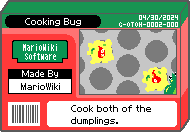
|
For the last step before shipping the game and making it available on the D.I.Y. Shop, the player can choose the cartridge shape and color and also select the color and style of the logo on it, select whether or not allow downloaders to edit the game themselves, and also write the description using up to 36 characters. Unlike records and comics, the logo picked is not seen on the zoomed boxart in the D.I.Y. Shop, only on its icon.
| Cartridge | Shape options | Color options |
|---|---|---|

|
| |
| Logo | Logo options | Color options |

|
|
Record MakerMatic[edit]
In this mode, the player can create a piece of music consisting of up to 24 phrases.
Music[edit]
The section where the song is created. The method of music editing works as explained above. The only exclusive functionality in this mode is the import button, which can be used to import the notes of the equivalent Track in another phrase into the current one.
Outside the phrase editing screen, the following functionalities exist:
| Phrases: The player may select a phrase for editing, rearrange phrases and place the Goal Flag, which indicates the end of the song. |
| Time Traveler: Allows undoing and redoing the last action. |
| Track Settings: Works as a shortcut for the settings found when editing a phrase, comprised of instrument type, volume and balance options for each track. |
| Stop: Stop song playback. |
| Play/Pause: Play or pause song. |
| Shuffle Beat: Toggle shuffle beat mode. |
| Song Tempo: Set the song tempo by sliding the slider. The available values range from 60 BPM and 240 BPM in increments of 10. |
Settings[edit]
In this section, the player may change the song title, which again can be up to 12 characters long and can be auto generated using the Auto button.
Finish[edit]
| Miniature | Detail |
|---|---|
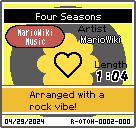
|
For the last step before shipping the game for the D.I.Y. Shop, the player can choose the label shape and color followed by the logo and its color as well, allow or disallow editing for downloads and set the description using up to 36 characters.
| Label | Shape options | Color options |
|---|---|---|

|
| |
| Logo | Logo options | Color options |

|
|
Comic MakerMatic[edit]
The Comic MakerMatic allows the player to make four-panel black-and-white comics.
Drawing[edit]
In this section, each panel can be selected for editing. Drawing works as explained above, with coloring limited to black and white and different Picture Stamps.
Picture Stamps[edit]
- Word Balloons: "For applying comic-style word balloons."
- Comic Effects: "For applying comic effects."
- Landscape: "For applying landscape elements."
- Wario: "For applying Wario and his friends."
- D.I.Y.: "For applying your custom-made stamps."
Settings[edit]
As it is the case for records, in this section, the player may change the comic title, with the same 12 character maximum length and Auto button for auto title generation.
Finish[edit]
| Miniature | Detail |
|---|---|
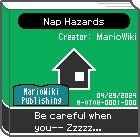
|
The player may pick the book color, the logo on the cover and its color as well, allow or disallow editing for downloads and set the description using up to 36 characters.
| Book | Color options | |
|---|---|---|
|
| ||
| Logo | Logo options | Color options |

|
| |
Names in other languages[edit]
| Language | Name | Meaning | Notes |
|---|---|---|---|
| Japanese | スーパーツクリエイター 21[?] Sūpā Tsukurieitā 21 |
Super Tsukreator 21 (pun on the Japanese verb tsukuru (作る, "to make") and the English word "creator") | |
| French | Super CréaMatique 21[?] | "Créa" comes from "création" (creation). "Matique" is the equivalent of "matic" | |
| Spanish (NOE) | Súper Inventamatic 21[?] | "Inventa" comes from "Inventar" (to invent) |
Trivia[edit]
- On the startup screen of the MakerMatic, the 1 of the 21 "blinks".
- The background of the startup screen is the same as the background of the DS. Also, the buttons are styled like the buttons on the DS startup screen. This makes sense, considering that the MakerMatic is made to resemble a DS.
- If the microgame's name is "Mario Paint", the design creation music will be changed to the Mario Paint default background music.
- While designing a record for shipping, the text for the two steps are switched around, with the label design screen reading "Select the color and style of the logo.", and the logo design screen reading "Select the shape and color of the label." This error is present in all the localized versions of the game bar the French version.
References[edit]
| WarioWare: D.I.Y. | |
|---|---|
| Main characters | Wario • Dr. Crygor • Penny • Mona • Jimmy T. • Ashley • Red • Orbulon • 9-Volt |
| Minor characters | Abby • Young Cricket • Master Mantis |
| Microgames | Mona • Jimmy T. • Ashley • Orbulon • 9-Volt • Job Center • D.I.Y. 101 |
| Locations | D.I.Y. Shop • D.I.Y. Studio • WarioWare, Inc. • Assembly Dojo • Distribution Center • Options Garage |
| Other | Super MakerMatic 21 • D.I.Y. Forum • Record (list) • Comics • Medals • Bomb |
| Further information | Gallery • Staff • Contests |
